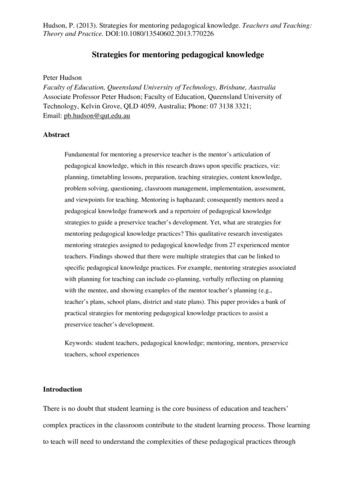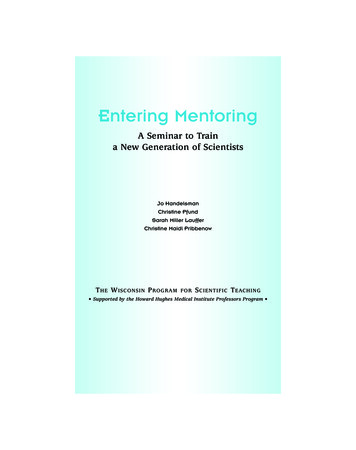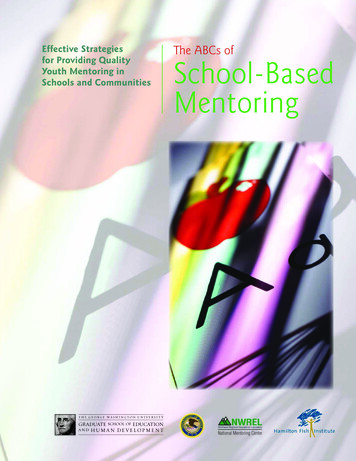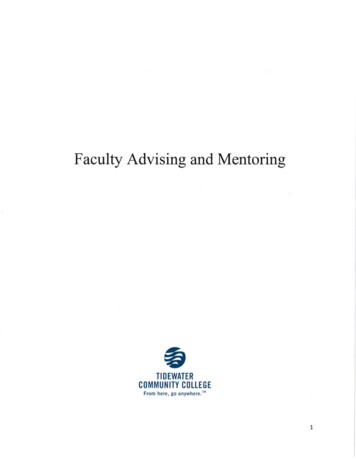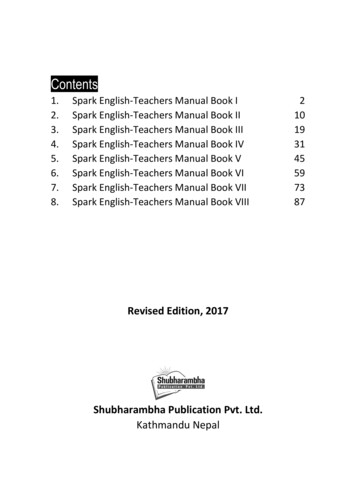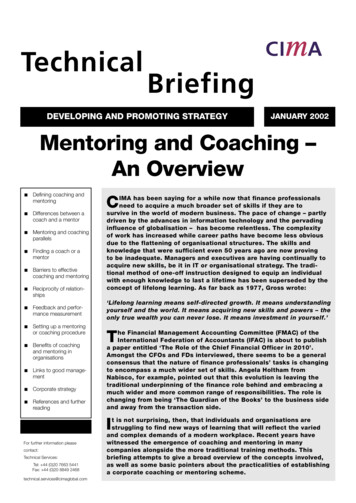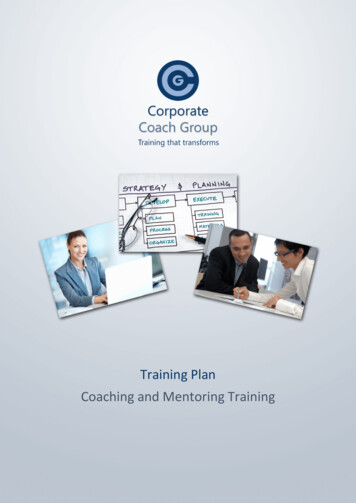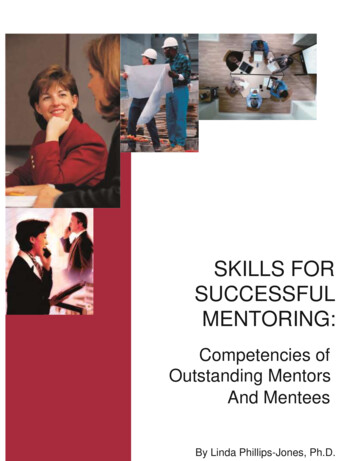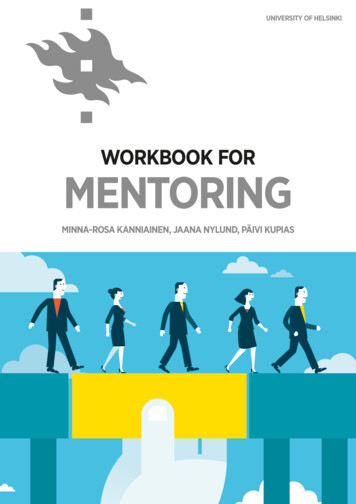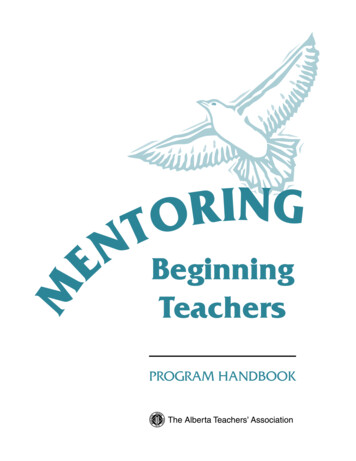
Transcription
MNENGIROTBeginningTeachersPROGRAM HANDBOOK
Table of ContentsForeword1Introduction2Purposes of a Mentoring Program4Relationship of Purposes of Mentorship andStages of Beginning Teacher Development5Stages of Teacher Development 5Basic Assumptions of a Successful Program6Dimensions of the Mentor Role8Colleagues in Reflection 8Mentoring Context 9Roles and Responsibilities10Role of the Mentor 10Responsibilities of the Mentor 10Role of the Protégé 11Responsibilities of the Protégé 11Role of the School Administrator 11Responsibilities of the School Administrator 12Roles and Responsibilities of School Districts and Locals 12The Profits of Mentoring13Program Evaluation15Evaluation of the Mentorship Program—Mentors 17Evaluation of the Mentorship Program—Protégés 18Mentors19Functions of Mentoring 20Needs of Beginning Teachers 21Helping Beginning Teachers with Critical Tasks 22Mentoring vs Evaluating 24i
Needs Assessment for Mentors 25Communication and Support 27The Mentor Traps 29Phases of the Mentorship Relationship 30Protégé31Starting Points 33Needs Assessment for Protégés 37Lesson Plan Reflection Sheet 38Reflection for Your Professional Portfolio 40The Protégé Traps 42Administrators43Responsibilities of Administrators 44Developing a Mentor Pool 44The Administrator Traps 45Further Suggestions for Mentors and Administrators 46iiDeveloping a Mentor–Protégé Plan47References49Appendix A—Mentor–Protégé Activities51Appendix B—Websites54Appendix C—Mentorship and Staff DevelopmentBibliography56Appendix D—Sample Mentorship Program67Appendix E—Mentorship Frame of Reference72
ForewordThe Program Handbook: Mentoring Beginning Teachers is intended toassist classroom teachers, school administrators, school districts andlocals in the development and implementation of a mentoring programfor beginning teachers. The mentoring of beginning teachers is a criticalcomponent of the induction of new teachers into the profession. Itmakes necessary connections between theory and practice, supportsthe professional and personal growth of beginning teachers andprovides professional-development opportunities for the mentorteacher.The Association’s mentorship program grew out of a model projecton mentoring (1996–98) in which the Association partnered with RedDeer City Local No 60 and Red Deer School District No 104. The modelproject has now grown to include most of the school districts andlocals in the province. This handbook will serve to provide a practicalresource for the establishment and implementation of a mentoringprogram for beginning teachers as well as a resource for sustaining theprogram.The handbook was developed by Dan J Garvey of the AlbertaTeachers’ Association, Professional Development program area. I hopethat this publication will be useful to mentors, protégés and others whoare involved in the mentoring program for beginning teachers.Gordon ThomasExecutive Secretary1
IntroductionLearning new curricula, dealing with classroom management anddiscipline, integrating students with special needs, using technology,individualizing student programs, coordinating extracurricularactivities and being accountable to the various stakeholders ofeducation are just a few of the jobs teachers do. Many of these dutiesare difficult for the most experienced professional, so one wonders howbeginning teachers survive, since they are expected, on their very firstday of employment, to do the job of a seasoned veteran. Many schooldistricts, seeing a need to nurture the new generation of teachers, haveput in place formal mentorship programs.Informal mentoring (buddy system) is not enough.New educatorsoften do not ask forthe help they need.ersach e.etudcedrien to intrepEx wantotdo nBeginning teachers needto observe new effectiveteaching models.Informal mentoringdoes not improveteaching over time.Informal mentoring programs aredifficult to identify and support.There is a need to identiify who is obtaining supportand the quantity as well as the quality of that support.Formal mentoring programs mustreplace informal mentoring programs.Mentoring is a nurturing process, in which a more skilled person,serving as a role model, teaches, sponsors, encourages, counsels andbefriends a less skilled or less experienced person for the purpose ofpromoting the latter’s professional development. Mentoring functionsare carried out within the context of an ongoing, caring relationshipbetween the mentor and the protégé (Anderson 1988).2
As described in the model of informal mentoring (Figure 1) the levelof competence of the protégé usually reaches the level of the mentor.This is a result of not going farther than the initial orientation of theprotégé. The mentor provides teaching materials, classroom teachingstrategies, and unit and long-range plans for the benefit of the protégé.This could be referred to as an apprenticeship model. The competencelevel of the mentor does not increase under this model. No reflectivepractice is in place, and no action research is carried out by mentor orprotégé. Little professional growth of the mentor takes place under thisinformal or buddy system.Under a formal mentoring process (Figure 2) the protégé not onlyreaches the competency level of the mentor but grows beyond theestablished baseline along with the mentor. The mentor may sharematerials but also goes beyond the sharing and moves into thedevelopment of materials within a collaborative team. This requiresreflective practice, collaborative planning and action research coupledwith a joint action plan by the mentor and protégé. Through thisprocess both mentor and protégé soar to new heights of professionalgrowth and petenceFigure 2ProtCompetenceFigure 1Experience(Garvey 2000)3
Purposes of a Mentoring ProgramOverall purpose is toimprove teaching and learning. Initial Orientation to Many Challenges New work setting New work culture of school community and organization New curriculum and assessment process Profession Improvement of Professional Practices Effective teaching models, strategies Leadership and management skills Development of the School as a Learning Community Lifelong learning orientation Moving beyond congenial to collegial4
Relationship of Purposes ofMentorship and Stages ofBeginning Teacher DevelopmentStages of Teacher Development Initial Orientation: Learning About the School How do you learn to plan and teach? How do you plan curriculum? How do you manage student behaviour? Improved Professional Practice How do you learn to improve teaching practice? What do you do to make it work better? How do you reflect- for teaching?- in teaching?- on teaching? Developing a Professional Learning Community What needs to be done to develop a collaborative community oflearners?Beginning teachers need to be assisted to move from the InitialOrientation stage through the Improved Professional Practice stage tothe Developing a Learning Community stage. This is the purpose andgoal of mentoring.Figure 3Developing aLearning CommunityImprovedProfessional PracticeInitialOrientation5
Basic Assumptions ofa Successful Program1. Mentoring is the central feature of a successful inductionprocess.2. Without mentoring, new staff focus on Orientation and takeconsiderable time to move to the Professional Practice and LearningCommunity stages.3. Both the mentor and the protégé gain from the mentoringexperience.4. Mentorship activities, structures and programs can vary widely,from mentor–protégé pairs to teams of mentors.5. Good teachers do not necessarily make good mentors. Adifferent set of skills is needed to work effectively with adultlearners.6. Mentors should be able to volunteer or to say, “No, not thisyear.”7. Learning to be a good mentor takes time.8. Mentors move from being expert teachers to novice mentors toexpert mentors (Figure 4). Training for mentors is needed from onelevel to the next.6
Figure 4Expert TeacherExpert MentorNovice MentorTeachers, although expert at pedagogy, find that they become novicementors—they, too, move through a learning cycle in terms of thementor process.Mentors will need specific mentor skills development in order tofacilitate the professional growth of the protégé.7
Dimensions of the Mentor RoleColleagues in ReflectionFigure 5Assistance ProviderService le ModelSupport Provider—Confidant—Advisor—Friend(Enz 1992, p 74, modified)There are three areas of support for the beginning teacher. Mentorsneed to recognize the importance of also being support providers.8
Mentoring ContextFigure 6BuildingTrustSchool Policiesand ProceduresNewGrowthPlanFocusedConferencingand CoachingProfessional Provincial expectations Policies andprocedures Roles, rights andresponsibilitiesInstructional Diagnosing Prescribing Evaluating ReportingLessonPlanningPersonal and Emotional Moral support Befriendment Well-being alysisGrowthPlanBased on Anderson 1998, p 41,Enz 1992, p 74Contained in the planning cycle are three areas in which beginningteachers need assistance: professional, instructional, and personal andemotional.9
Roles and ResponsibilitiesRole of the MentorMentor teachers are increasingly sought to provide more effectiveschool-based support for beginning teachers.Successful mentorship depends upon clarity of participant roles andresponsibilities. Successful programs have shown that mentors should continue to teach while serving as mentors, understand the typical needs and challenges of the beginningteacher, develop and use a variety of strategies to assist the beginningteacher, prepare themselves for effective one-on-one consultation withindividual teachers, initially focus their efforts in areas known to be difficult for noviceteachers, make the accumulated wisdom of other experienced teachersaccessible to beginning teachers and develop strategies for giving acceptance and support for thebeginning teacher within the school context.Responsibilities of the MentorThe responsibilities of mentors, once matched, are to encourage and support the acculturation of the protégé into thedistrict, prepare and implement a joint mentorship growth plan with theprotégé, maintain a relationship with the protégé consistent with the Codeof Professional Conduct, model and demonstrate effective teaching strategies, observe and provide feedback to the protégé, assist the protégé in identifying personal strengths and planningfor further professional growth, and assist the protégé with curriculum and instructional planning.10
Role of the ProtégéThe role of the protégé is complex. As a beginning teacher, the protégéis a qualified professional as is the mentor. The difference lies in therepertoire of teaching and management strategies that the experienced,veteran teacher possesses.Just as the role of the mentor is based on a number ofunderstandings, the role of the protégé is based on some key principles.For the most part protégés still have much to learn about putting their knowledge to work; develop their own teaching styles over time; develop active listening and consultation skills; are committed to an ethos of collegial reflective practice; develop observation and analytic strategies to enhance theirteaching effectiveness; provide guidance, support and assistance in analyzing teachingthat enhances their own teaching effectiveness; and move through well-delineated stages of development from dayto-day survival to concerns about managing responsibilities toconcerns about the impact of their teaching to raising questionsabout their profession.Responsibilities of the ProtégéThe responsibilities of the protégé, once matched with a mentor, are to prepare and implement a joint mentorship growth plan with thementor and maintain a relationship with the mentor consistent with the Codeof Professional Conduct.Role of the School AdministratorThe role of the school administrator is key in developing a mentorshipprogram. The school principal is in a position to assign or approvementor and protégé teams based on the strengths and needs of theschool staff.The role of the school administrator is to facilitate the process ofmentorship within the school. Principals need to11
initiate mentorship programs based on the needs of the staff, inform potential mentors and protégés about the process andprogram, facilitate the use of time and resources for the mentorshipprogram and assign/approve mentorship teams early in the school year or atthe end of the current year for the following year.Responsibilities of the SchoolAdministratorPrincipals with staff involved in the program have a responsibility for facilitating joint growth planning for the protégé and mentor, providing for common release time for the protégé and mentorwith either the instructional or the non-instructional requirementsof the collective agreement on a regular and ongoing basis, recruiting mentors who meet the identified criteria established bythe mentorship steering committee and arranging costs for release time for the mentor and protégé toparticipate in the program’s large group sessions.Roles and Responsibilities of SchoolDistricts and LocalsThe district and the local are responsible for establishing a steering committee; promoting the program in the district (information meeting forprincipals and interested experienced and beginning teachers); contributing financial resources to support the mentorshipprogram; identifying criteria for selection of mentors; delivering the following common program of events that make upthe inservice component of the program:–orientation meeting for all participants, including principals,–mini-conference(s) or workshops, and–evaluation and wind-up session for all participants; matching protégés and mentors if not done at the school level and evaluating the mentorship program.12
The Profits of Mentoring1. For the Beginning Teacher Access to the knowledge, experience and support of a mentorteacherEnhanced personal and professional well-being because ofreduced stress during the transitionIncreased job success, self-confidence and self-esteemReduced trial-and-error learning and accelerated professionalgrowthSupport for successful induction into the teaching career2. For the Mentor Increased learning, renewal and teaching performanceRecognition as an excellent teacher conferred through status as amentorRefocus on instructional practices and the development ofreflective skills Opportunity to serve the profession Gratitude of the protégé3. For the Administrator A helping hand from the mentor with beginning teacherorientation and supportBetter performance from both beginning and mentor teachersReduced teacher attrition and time required for beginning teacherrecruitment, development, supervision and problem solving13
4. For Students Teachers who focus on student needs rather than their ownsurvivalIncreased instructional continuity due to reduced annual teacherturnoverBetter teachers, who are less authoritarian and dominating andmore reflective and disposed to continuous improvementTeachers whose self-confidence leads them to use a wider rangeof instructional strategies and activities5. For the Profession 14Retention of the best, most creative teachersRetention of experienced teachers who find a new challenge andopportunity for growth by serving as mentorsIncreased continuity of traditions and positive cultural norms forbehaviourEstablishment of professional norms of openness to learningfrom others, new ideas and instructional practices, continualimprovement, collaboration, collegiality and experimentation
Program EvaluationThe purpose of evaluation of the mentorship program isaccountability. When time, money and human resources have beenexpended, it is advantageous to the program to know to what extentperformance of beginning teachers has been enhanced, if the retentionrate of teachers has improved and if mentor teachers have becomemore reflective and collaborative.The evaluation of the mentorship program must be driven by thegoals established by the steering committee directing the program.Evaluation should be limited to outcomes related to the specific goals.Two aspects of evaluation must be considered: accountability andimprovements to the program.Accountability Teachers are more knowledgeable about student learning. Instructional strategies have increased and improved. Beginning teachers have moved from survival through Orientationto the Professional Practice level. Beginning teachers have a greater understanding of the profession. The retention rate of beginning teachers has increased.Improvements to the Program The level of effectiveness of the support provided to the protégé hasrisen. The training provided is appropriate for mentor teachers. Knowledge and understanding of the mentorship process haveincreased. The program meets the needs of the beginning teacher.15
The evaluation process should not focus on a one-time survey.Rather, it should consist of multiple sources of information, bothanecdotal as well as evidence from surveys. Reflective teaching logs area valuable data resource. It is important to evaluate the process (howcan we do this better?) as well as the product.The following are examples of surveys developed by Oak CreekFranklin Joint School District Partners for Success Program, Oak Creek,Wisconsin, that can be used to provide evaluative feedback. The resultsmay provide qualitative data on the effectiveness of the programand information useful in future planning. Quantitative data can beacquired through the district retention rate over time. Exit interviewsof teachers leaving the school or system provide data for improvingsystem and local programs.16
Evaluation of the Mentorship Program—MentorsPlease respond to the following statements using a sliding scale of 1 to 4 with1 being poor and 4 being very effective.1. I felt well-prepared to be a mentor following thementorship orientation.1234N/A2. A mentor training session helped prepare me to be a mentor.1234N/A– Curriculum1234N/A– Student Assessment1234N/A– Instructional Strategies1234N/A– Classroom Management1234N/A– School/District Expectations of Teachers1234N/A– Budget1234N/A– Legal Issues and Contractual Rights/Responsibilities1234N/A– Finding or Developing Resources1234N/A– Becoming Oriented to the School1234N/A– Becoming Oriented to the District1234N/A– Communicating with Parents1234N/A– Assisting with Special Needs Students1234N/A– Completing Forms, Paperwork, etc.1234N/A4. I provided helpful feedback during observations of my protégé.1234N/A5. I was able to learn things from this experience that enhancedmy own teaching.1234N/A6. I experienced professional growth as a teacher by participatingin this program.1234N/A3. I was able to provide guidance to my protégé in the area of7. Some of the topics or activities that were most helpful to me and/or my protégé include8. Some of the topics or activities that were least helpful to me and/or my protégé include9. Suggestions I have for improving the mentoring program include17
Evaluation of the Mentorship Program—ProtégésPlease respond to the following statements using a sliding scale of 1 to 4 with1 being poor and 4 being very effective.1. I felt my mentor was willing and able to be a mentor.1234N/A2. The orientation program helped me feel prepared tostart the school year in the school district.1234N/A– Curriculum1234N/A– Student Assessment1234N/A– Instructional Strategies1234N/A– Classroom Management1234N/A– School/District Expectations of Teachers1234N/A– Budget1234N/A– Legal Issues and Contractual Rights/Responsibilities1234N/A– Finding or Developing Resources1234N/A– Becoming Oriented to the School1234N/A– Becoming Oriented to the District1234N/A– Communicating with Parents1234N/A– Assisting with Special Needs Students1234N/A– Completing Forms, Paperwork, etc.1234N/A4. I received helpful feedback during observations by my mentor.1234N/A5. I felt comfortable or able to seek help from thesteering committee.1234N/A6. I was able to learn things from this experience that I could applyin my classroom and that helped improve my teaching.1234N/A7. I experienced professional growth as a teacher by participatingin this program.1234N/A3. I received sufficient guidance from my mentor in the area of8. Some of the topics or activities that were most helpful to me include9. Some of the topics or activities that were least helpful to me include10. Suggestions I have for improving the mentorship program include18
Mentors“Because teaching is a newexperience every time you walk intoa classroom, good teachers builda repertoire of strategies and toolsthat they can use when they needthem. Good mentors share theirtools with their protégés and helpthem build their own repertoire.”—An elementary principal19
MentorsMentors are to be congratulated for accepting the opportunity tomentor those entering the teaching profession and for contributing tothe growth of the profession.Functions of Mentoring1. TeachingTeaching the protégé the skills that skilled mentors (unconsciouslyor consciously) practise on a daily basis is difficult. Manyexperienced teachers teach instinctively, which makes it difficult forthem to analyze their own teaching. In order to teach the protégé,the mentor must become a reflective practitioner.2. SponsoringSponsoring the protégé is another function of mentoring. Thementor must identify the strengths of the protégé and advise theprotégé as to what activities would be most successful. Sponsoringthen requires the mentor to support the protégé when he or sheattempts the new practice.3. EncouragingEncouragement is a key mentor function. By helping protégés seethe positive side of their teaching practice and building on thosereflections, the mentor is supporting and encouraging the growth ofthe protégé.4. CounsellingCounselling is the fourth function of mentoring. Protégés needsound advice regarding teaching practice, professional conduct andthe culture of the school and community.5. BefriendingThe fifth function of mentoring is befriending—protégés needsomeone to whom they can speak freely.20
Needs of Beginning TeachersBeginning teachers can be overwhelmed by the initiation to teachingand require timely assistance. They need the following: To receive just-in-time learning rather than just-in-case learningWhat do I need to learn, know and practise now rather than later?What do I need to know about the first staff meeting, the first reportcards and parent/student/teacher conferences? To be given information and allowed to ask questionsBeginning teachers often do not know what questions to ask andneed to be directed to take appropriate actions. To be acceptedBeginning teachers often move into communities and schools inunfamiliar areas. These new teachers need to be welcomed andvalued as contributing members of the school and the community. To be valuedBeginning teachers come to the profession with a wealth of newknowledge and skills and should be acknowledged and appreciatedfor the fresh outlook that they bring to the profession. To be treated as colleaguesBeginning teachers are active members of the profession anddeserve to be treated as valued colleagues. To be treated as professionalsHow can mentors assist new teachers to grow as professionals in atimely fashion?21
Helping Beginning Teacherswith Critical TasksBasic Issues1. Classroom Management Arranging the classroom setting Bulletin boards Planning Teaching rules Policy/procedures (written/unwritten) Managing student work Establishing a positive classroom climate Supporting good student behaviour Conducting instruction and maintaining the momentum Getting off to a good start2. Planning for Instruction22 Available resources Long-range, unit and daily plans Cumulative records Student data Grouping/whole groups Pacing Parental involvement Reporting to parents School and district policies Parent/teacher/student conferences
3. Teaching Content Curriculum guides Program of studies Expected learner outcomes Testing Diagnostic/formative/summative assessment Professional resources4. Engaging and Motivating Students Centres Cooperative planning Project approaches Alternative delivery strategies Working with parents Cooperative learning Use of alternative facilities–Field trips–Labs–Library–Technology23
Mentoring vs EvaluatingEvaluating the protégé is not a function of mentoring.Trust is essential in a mentor–protégé relationship. It is imperativethat the mentor be viewed as a trusted colleague rather than anevaluator or judge. Mentoring is collegial; evaluating is hierarchical. Mentoring is ongoing; evaluating is defined by district andprovincial policy. Mentoring encourages self-reliance and growth; evaluatingjudges individual teaching performance. Mentoring keeps data confidential; evaluating uses it to judge. Mentoring uses value judgments made by the mentor andprotégé; in evaluation, value judgments are made by thesupervisor.The mentor–protégé relationship must exist within the framework ofthe Code of Professional Conduct of the Alberta Teachers’ Association.24
Needs Assessment for MentorsPlease choose the response that most closely indicates your level of need for assistancein the area described in each item.Possible ResponsesA. Little or no need for assistance in this areaB. Some need for assistance in this areaC. Moderate need for assistance in this areaD. High need for assistance in this areaE. Very high need for assistance in this area1. Learning more about what is expected of me as a mentor2. Collecting classroom observation data3. Diagnosing needs of my protégé4. Developing interpersonal skills that support the mentoring process5. Assisting my protégé with classroom management6. Helping my protégé develop a variety of effective teaching strategies7. Using principles of adult learning to facilitate the professional growth of my protégé8. Socializing my protégé into the school culture9. Helping my protégé maintain student discipline10. Helping my protégé design a long-range plan for professional development11. Finding resources and materials for my protégé12. Providing emotional support for my protégé13. Co-teaching with my protégé14. Managing my time and work15. Developing problem-solving strategies16. Helping my protégé motivate students17. Helping my protégé assist students with special needs18. Helping my protégé diagnose student needs19. Helping my protégé plan for individual differences among students20. Helping my protégé evaluate student progress21. Engaging in expert coaching of my protégé—Based on Gordon (1991), How to Help Beginning Teachers Succeed, ASCD.25
Questions to ConsiderWhat other needs do you have as a mentor that are not addressed by the needsassessment?The mentorship program is intended not to supplant existing support programs forbeginning teachers but to enhance system or school programs.What types of support are available to beginning teachers at the school and systemlevels? for mentors?What types of support not currently available should the school district provide?How will the results of the needs assessment inform the joint planning of the mentorand protégé?How will the plan inform the program for the training of mentors?26
Communication and SupportThe most common concern for new mentors is how to communicatesupport without being intrusive. At the same time, protégés areconcerned about burdening the mentor with all their questions. Astalemate. Protégés need constant reassurance that mentors don’t mindhelping. Here are a few ideas to ease the tension: Compliment the protégé. Take a coffee break or lunch together. Spend an evening together. Share a ride to an event. Give information about ways togain the support of key individuals. Give suggestions for acquiring scarce resources. Offer an invitation to a small get-together with other colleagues.27
Mentor CommunicationSelf-AssessmentDo you do what you say you will do?Do you treat in confidence anything of a personal orprofessional nature?Do you respond to statements and questions?Do you express your feelings and thoughts about a topic underdiscussion?Do you respect the ideas and feelings of the protégé, eventhough you may not agree?Do you check your assumptions through paraphrasing?Do you encourage your protégé to probe for his or her ownanswers?Do you use descriptive rather than evaluative or judgmentallanguage?Do you let your body language reinforce the intent of yourwords?Do you provide opportunities for clarification?Are you sensitive to mixed messages?Do you probe for thoughts and feelings as well as facts whendiscussing professional issues?Do you encourage the protégé to provide more details when heor she is offering important information?28
The Mentor TrapsMentors need to be aware of the following traps. I can help. Mentors are helpers; but sometimes the protégé needsto find his own way. Don’t feel rejected when your assistance isdeclined or your advice is not taken. Experience is also a powerfulteacher. I know best. Protégés are not here to stroke your ego; they are here tolearn. Be honest with yourself. If you relish compliments from yourprotégé, you may be using them to fulfil your own needs. Be careful.This is a dangerous trap. I can help you get ahead. Mentors do open doors that help the protégéget ahead. However, this can lead to scorekeeping, which is unfair tothe protégé. You need me. This lays the groundwork for a relationship builton dependency. The focus should be on improving the protégé’spractice. FYI you have an IEP meeting regarding your ADHD from the SASP.Avoid jargon and explain it when others use it.
ii 1 The Program Handbook: Mentoring Beginning Teachers is intended to assist classroom teachers, school administrators, school districts and locals in the development and implementation of a mentoring program

